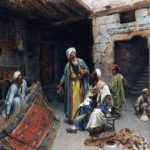
God almighty says: Do they not then earnestly seek to understand the Qur'an, or are their hearts locked up by them? [Qur’ān: XLVII, 24]. The call is clear, to ponder the Qur’ān and examine it. In my opinion the examination is not confined in the Qur’ān to contemplating its authoritative meanings alone, but to pondering the meanings in the context and occasion of their revelation. This is one of the basic elements that go to make up the sense.
BY OLFA YOUSSEF
TAKING THINGS from this view, we will attempt to examine here the widespread dictum concerning the Qur’ān which runs: “The Qur’ān is valid for all times and places.” We should note at the outset that this saying is a recent one in that we don’t find it repeated in any of the books of the ancients. This may indicate that the issue is of recent date and follows historical developments when new questions arose which might not have been clearly mentioned in the Qur’ān, questions such as the issue of transcription or the consumption of drugs and so on.
This dictum, in my opinion is capable of two interpretations:
The first interpretation (the most commonly held one) is that actual human history must constantly reshape itself to conform to the meaning of the Qur’ānic text. For the Text, in this conception, is fixed; it has a single established meaning and therefore it is historical reality that has to be changed in order to suit this meaning. Under this interpretative scheme we could group the occasional voices raised calling for the restoration of slavery or the marriage of young girls and so on. Other examples of this scheme are the fatwās issued from time to time such as the one on breastfeeding an adult (to permit a woman to work alongside male colleagues), or the fatwā forbidding any music that contains stringed instruments or the prohibition of any photographic depiction of a living person.
The thinking behind these voices does not come ex nihilo but from the religious texts themselves, for the Qur’ān did not literally forbid slavery. It is true that it did not call for it either, but rather dealt with it as a pre-existing fact. Nothing indicates this more than the verses which define the rulings on slavery with special hudūd punishments applicable to slave girls as opposed to freeborn girls, and the definition of conditions for manumission and so on. The Qur’ān also did not define a special norm for marriage, and the Hadīth that the specialist scholars enumerate as ‘sound,’ according to their standards, are on the level of breastfeeding an adult or prohibiting photography and the like.
These voices believe that the meaning of the Qur’ān is frozen
These voices are reading the Qur’ān literally, or let us say they view the sense of the Qur’ānic passages in a way that disregards what are the basic constituents of meaning – the context and the occasion. These voices believe that the meaning of the Qur’ān is frozen and that whatever occurs in the life of Mankind, or whatever developments and alterations they observe, must needs alter themselves so as to reflect this fixed, frozen meaning.
The second interpretation of the dictum ‘The Qur’ān is valid for all times and places’ is that the Qur’ān is to be considered as bearing a variety of meanings that are valid for all times and places. From this viewpoint the Qur’ān is indeed a miraculous Text in which God Almighty omitted nothing. The foundation of this comprehensiveness is the power of the meanings in the Text, in that they are multiple, and cover all possibilities and historical circumstances.
It is gratifying to see that the way that many of those who witnessed the birth of Islam deal with the Qur’ān may be classed as coming under this second interpretative scheme. The best known example of this relates to ‘Umar ibn al-Khattāb who placed a moratorium on the cutting of hands during a year of famine. This, it must be remembered, is an unequivocal Qur’ānic passage which does not require a context or an occasion for cutting the hands of a thief. Indeed the Text gives a general form to this expression:
As for the thief, both male and female, cut off their hands. It is the reward of their own deeds, an exemplary punishment from Allah. Allah is Mighty, Wise [Qur’ān, V,38].
‘Umar ibn al-Khattāb’s historic decision to take the context of the famine into consideration and override the letter of the Text and its overt meaning in favour of its deeper purpose constitutes a revolutionary understanding of the Qur’ānic text, especially when compared with what we find today among some latter-day scholars who hold to the literalism of the fixed Text.
This revolution is embodied in the concept of Maqāsid al-Sharī‘a (‘Aims of the Sharī‘a’) found of old in the Al-Muwāfiqāt of al-Shātibī, or in Tāhir ibn ‘Āshour’s Kitāb Maqāsid al-Sharī‘a, for example. When we speak of the purposes of the Sharī‘a, we speak of matters that preserve the life, honour and wealth of a man. Yet in and of itself this is to override the literal reading of the Text, in that the study of the purposes behind the Text is not the study of its authoritative, literal, yet changing meanings but rather a study of whether these literal meanings are sound. Thus we can distinguish between the essential purposes which govern the Text which is considered valid for all times and places, and the literal, contextual meanings which change according to the various circumstances.
To put it more clearly and to return, for example, to the moratorium on cutting the hands of the thief, the purpose of the Divine Lawgiver in cutting off the hand (taking the literal understanding) is to punish the wrongdoer in order to enable man to coexist in society. As the saying goes ‘Do we not have life through reprisal?’ But the punishment of the wrongdoer at a time of famine does not serve this function or that purpose on the grounds that the motivation for the ‘theft’ was a need that society had failed to provide to its individuals. From this point of view the literal meaning of cutting the hand – that is, as one of the purposes of the Lawgiver – is not realized in this case. Indeed the opposite is taking place, in that it becomes a form of oppression of this man who was forced by hunger to steal, an act that cannot therefore be described as being ‘of his own free will’.
It is as part of this scheme that we can classify what the successors of ‘Umar did centuries after his death when they decided to ban slavery, despite the absence of any clear text prohibiting it. Although the literal Text calls for it, slavery does not conform to the essence of the Qur’ān and the essence of Islam, which stand for equality between all mankind. The equality purpose of the Sharī‘a takes universal precedence over the absence of any banning of slavery, which is a phenomenon bound up with what social historians know of the historical and economic conditions prevailing at the time of the revelation of the Qur’ān and the period subsequent to that.

Suggested Reading
In these two examples (and there are many others besides) we can discern that the validity of the Qur’ān for all times and places does not refer to the commonly held understanding that posits the alteration of actual history to suite the fixed meanings of a text. Rather, the validity of ‘the Qur’ān for all times and places’ lies in its comprehensiveness that allows for various interpretations of the meanings; these include literal meanings that can be taken in some contexts (such as the hudūd punishments for theft and slavery) and value meanings governing these literal meanings (equality among all mankind, the moratorium on hudūd punishments if conditions do not justify their application etc) which can be adopted in other contexts.
Mahmud Taha presented an elegant reading of the Qur’ān which may be grouped under this scheme. His view is that the noticeable difference between the Meccan verses, which are founded upon the peaceful propagation of the faith through preaching, and the Madinan verses, founded upon the conflict with the polytheists, is not a difference between the Medinan, abrogating verses and the Meccan, abrogated verses. Instead it is the difference on the one hand between the verses whose meanings are literal and connected with the historical phase in which preaching to the polytheists was of no avail, and which allowed them to continue harming the Prophet and his Companions, and on the other between verses whose meanings embody the essence of Islam and of all religions, meanings that are based on tolerance, dialogue and an amicable competition.
We are conscious that Almighty God omitted nothing from His Book, and that He called upon us to ponder the Qur’ān in such a way that we understand that the validity of the Qur’ān for all times and places is implicit in the manifold meanings of the Qur’ān, meanings which comprehend all the capacities of actual human development down the ages.


